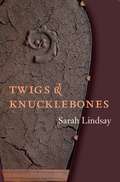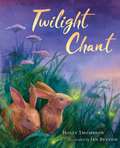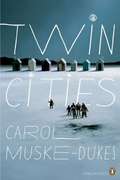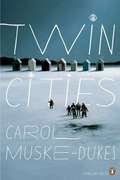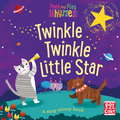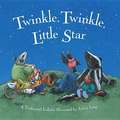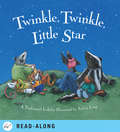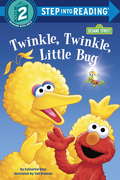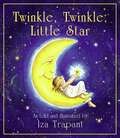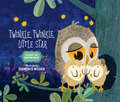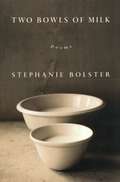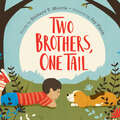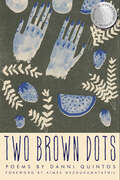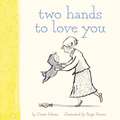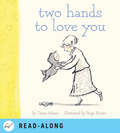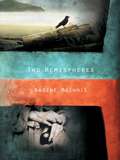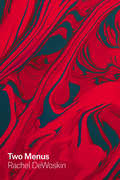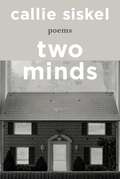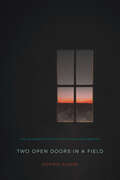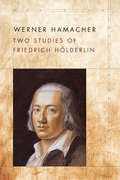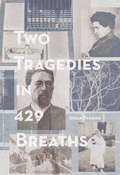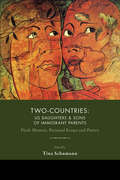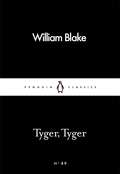- Table View
- List View
Twigs and Knucklebones
by Sarah Lindsay"Had Dr. Dolittle fathered a prodigious daughter, she might well be behind the bizarre and entertaining personae found on the pages of Lindsay's first-book bestiary...Lindsay's dark-edged, sometimes creepy poems are also imbued with a buoying sense of respect for the different, the unexpected and the challenging.... In work reminiscent of Amy Clampitt and of Albert Goldbarth, Lindsay weaves informed and moving lyric claims around scientific facts, lamenting extinct species or following local rivers." --Publishers Weekly "Twigs & Knucklebones is a rare thing in poetry--a very good read....(Sarah Kindsay's) voice...is omniscient yet intimate, super-literate and flawlessly graceful, like a really good lecturer who knows how to entertain an audience while speaking on complex subject matters." --Poetry Foundation"With wonder and bemusement, Lindsay writes supple, sparkling poems about life's perpetual coalescence and breaking down....The heart of this mordant yet profoundly compassionate book is a vivid and involving series about the fictional ancient kingdom of Nab. Here Lindsay sifts through the detritus of a civilization, imagines the inner worlds of people long gone, and the layering of tomb upon tomb, city upon city as bone, clay vessels, and the inscribed tablets are all crushed into splinters and shards." --Booklist"Sarah Lindsay is blessed with the sort of X-ray vision a philosopher would kill for."--The New York Times Book ReviewQuirky, macabre, vivid, and fascinating, Sarah Lindsay's poetry in Twigs and Knucklebones melds science and art with astonishing facts that might just be true: spadefoot toads singing till their throats bleed, an explorer tumbling into an Antarctic crevasse and swinging from his tether like a pendulum.Many of Lindsay's poems occur in extremis, and the situations are often severe and surreal: the futuristic "Valhalla Burn Unit on the Moon Callisto" or a bog person discovered in Eske's Field. These characters often span--in the space of a poem--various times, cultures, and contexts. Lindsay also creates her own fictional kingdom and peoples it with outlandish characters, including jerboas, megalomaniac archaeologists, an adjunct professor, goatherds, farmers, and the god Nummis, who is depicted with a "hawk on his head, fish in one hand, horned ibex at either side."We prod and whisk and deduce what we canfrom marks in clay, from the trace of a wall.But the way the king tossed and caught his adoring daughters,the foolish songs he improvised for his wife, and his furry voice--these have been safely forgotten.Sarah Lindsay is the author of two previous books of poems. Her debut volume was a finalist for the National Book Award. She lives in North Carolina.
Twilight Chant
by Holly Thompson Jen BettonA lyrical exploration of the transition between day and night and of the animals who thrive during this special time. As day slips softly into night, sharp eyes catch glimpses of the special creatures who are active at dusk. Lyrical text and lush art capture the richness and life of this magical time in a sumptuous picture book that will inspire budding naturalists and anyone who has ever chased a lightning bug at twilight. An author’s note about twilight is included.
Twin Cities
by Carol Muske-DukesA sophisticated and lyrical new collection from one of today's finest living poets. Carol Muske-Dukes is an acclaimed novelist and poet whose latest collection, Sparrow, a haunting elegy for her late husband, was a finalist for the National Book Award. Twin Cities is an emotionally rich book of poems about how things double-by reflection, by reproduction, by severance. The poems embark from the twin cities of Minneapolis and St. Paul, divided by a legendary river, and move on to the parallel histories of a life lived and a life imagined-and the random intersection of the two. Lit by loss, these moving poems navigate between the poles of love and grief, curse and blessing, abandonment and rescue-they are two, and they are one. .
Twin Cities
by Carol Muske-DukesA sophisticated and lyrical new collection from one of today's finest living poets. Carol Muske-Dukes is an acclaimed novelist and poet whose latest collection, Sparrow, a haunting elegy for her late husband, was a finalist for the National Book Award. Twin Cities is an emotionally rich book of poems about how things double--by reflection, by reproduction, by severance. The poems embark from the twin cities of Minneapolis and St. Paul, divided by a legendary river, and move on to the parallel histories of a life lived and a life imagined--and the random intersection of the two. Lit by loss, these moving poems navigate between the poles of love and grief, curse and blessing, abandonment and rescue--they are two, and they are one.
Twinkle Twinkle Little Star: A baby sing-along book (Peek and Play Rhymes #4)
by Pat-a-CakeTwinkle Twinkle Little Star combines lively pictures with a classic nursery rhyme that's easy for parents and carers to recognise and recite. Young children will adore singing along. The spotting game at the end is a great incentive to go through the pages once again until each tiny thing is found! Nursery Rhymes are important stepping stones to language development. The rhymes usually tell a story, too, with a beginning, a middle and an end. This teaches children that events happen in sequence, and they begin to follow along. Nursery rhymes are also full of repetition, making them easy to remember, and often become some of a child's first sentences. Also available: The Wheels on the Bus, Hey Diddle Diddle, Old Macdonald had a Farm
Twinkle, Twinkle Little Star
by Sylvia LongCherished for nearly two centuries, the traditional lullaby "Twinkle, Twinkle, Little Star" continues to send children off to dreamland. In this tenderly illustrated edition of the classic rhyme, award-winning artist Sylvia Long touches the hearts of reader yet again. Her detailed watercolors depict a group of animal friends as they make their way home under the night sky to complete their bedtime rituals with their families. The last verse finds each baby animal nested in bed. Twinkle, Twinkle, Little Star is the perfect bedtime story, sure to lull children to sleep.
Twinkle, Twinkle Little Star: A Traditional Lullaby
by Sylvia LongCherished for nearly two centuries, the traditional lullaby "Twinkle, Twinkle, Little Star" continues to send children off to dreamland. In this tenderly illustrated edition of the classic rhyme, award-winning artist Sylvia Long touches the hearts of reader yet again. Her detailed watercolors depict a group of animal friends as they make their way home under the night sky to complete their bedtime rituals with their families. The last verse finds each baby animal nested in bed. Twinkle, Twinkle, Little Star is the perfect bedtime story, sure to lull children to sleep. Plus, this is the fixed format version, which will look almost identical to the print version. Additionally for devices that support audio, this ebook includes a read-along setting.
Twinkle, Twinkle, Little Bug (Step into Reading)
by Katharine Ross Tom CookeBig Bird, Elmo, and their friends learn something special about friendship from a little lightning bug in this Sesame Street Step 2 Step into Reading title. Beginning readers who are reading with help will enjoy this sweet story starring their favorite characters from Sesame Street.From the Trade Paperback edition.
Twinkle, Twinkle, Little Star (Iza Trapani's Extended Nursery Rhymes)
by Iza TrapaniIn this expanded version of the favorite nursery rhyme, Iza Trapani takes the earliest readers on a journey across the night sky. With playful verse and bright illustrations Iza Trapani introduces us to our irresistible young heroine as she wishes upon a mischievous, twinkling star. Granting her wish, the little star takes her on a dazzling and daring trip among swirling planets and beaming stars for one magical night. This new spin on the much-loved classic is a wonderful gift for even the littlest stargazers. Over 1 million copies in print!
Twinkle, Twinkle, Little Star: A Light-Up Bedtime Book
by Florence WeiserReal twinkle lights make this bedtime board book of a classic lullaby the perfect read for any sleepy child. Adapted from the classic lullaby, Twinkle, Twinkle, Little Star captures the gentle magic of bedtime. With a brand new ending, the song encourages children to fall asleep peacefully beneath the stars. Florence Weiser's soft, soothing illustrations depict an array of animal babies at their bedtimes, inspiring a calming nighttime atmosphere. This board book is complete with twinkling lights that make each page glow while parents and children settle in for their nightly routine. Families will delight in this adorable new take on a familiar lullaby and enjoy the tranquility of its sleepy, rhyming verse.
Two Bowls of Milk
by Stephanie BolsterThe poems of Stephanie Bolster’s second collection move with delicacy and power, whether focussing on a flock of snow geese on a flooded plain, on the paintings of Jean Paul Lemieux, or on two wasps in a Pepsi can on the steps of the Metropolitan Museum of Art. These intimate acts of language create a space infused with stillness and an edgy expectation. Here is a poetry of engagement and mystery, in which truth is found in seepage and reversal: the bowls of milk the colour of milk; the two facing human profiles forming between them the shape of a vase. This volume sketches a clear, unwavering arc through poems sometimes raw and painful, but always exquisite, and, ultimately, transformative. Two Bowls of Milk confirms Stephanie Bolster as one of the most gifted new poets in Canada today.
Two Brothers, One Tail
by Richard T. Morris"A gentle and loving illustration of the absolute bond between a boy and his canine buddy." -KirkusA sweet and charming picture book about the unending love between a boy and his dog.Two brothers, two handsTwo brothers, four pawsTwo brothers, ten fingersTwo brother, ten clawsWith simple rhyming text by Richard T. Morris and charming illustrations from Jay Fleck, Two Brothers, One Tail is a heart-warming story about a boy and his brother, who just happens to be a dog. Perfect for fans of Bad Dog, Marley and Harry the Dirty Dog!
Two Brown Dots (New Poets of America #46)
by Danni QuintosSelected by Aimee Nezhukumatathil as the winner of the A. Poulin, Jr. Poetry Prize, Danni Quintos carves a space for brown girls and weird girls in her debut collection of poems. Two Brown Dots explores what it means to be a racially ambiguous, multiethnic, Asian American woman growing up in Kentucky. In stark, honest poems, Quintos recounts the messiness and confusion of being a typical ‘90s kid—watching Dirty Dancing at sleepovers, borrowing eye shadow out of a friend’s caboodle, crushing on a boy wearing khaki shorts to Sunday mass—while navigating the microagressions of the neighbor kids, the awkwardness of puberty, and the casual cruelties of fellow teenagers. The mixed-race daughter of a dark skinned Filipino immigrant, Quintos retells family stories and Phillipine folklore to try and make sense of an identity with roots on opposite sides of the globe. With clear-eyed candor and a wry sense of humor, Quintos teases the line between tokenism and representation, between assimilation and belonging, offering a potent antidote to the assumption that “American” means “white.” Encompassing a whole journey from girlhood to motherhood, Two Brown Dots subverts stereotypes to reclaim agency and pride in the realness and rawness and unprettyness of a brown girl’s body, boldly declaring: We exist, we belong, we are from here, and we will continue to be.
Two Hands to Love You
by Paige Keiser Diane AdamsI'll bathe you in bubbles and soak you in sun,then wrap you up tightly when bath time is done.With two loving hands, an adoring mother cradles her baby after bath time and a devoted father lifts his newborn to look into a nest. Sister, brother, grandma, and grandpa all can't wait to share what they love best with their newest family member. And when it is time to step out into the world, this caring family is right there alongside their littlest one. In simple, heartfelt language, this soothing picture book for the very young will tug at the heartstrings and remind us all of the caring hands that helped us along our way.
Two Hands to Love You
by Paige Keiser Diane AdamsI'll bathe you in bubbles and soak you in sun,then wrap you up tightly when bath time is done.With two loving hands, an adoring mother cradles her baby after bath time and a devoted father lifts his newborn to look into a nest. Sister, brother, grandma, and grandpa all can't wait to share what they love best with their newest family member. And when it is time to step out into the world, this caring family is right there alongside their littlest one. In simple, heartfelt language, this soothing picture book for the very young will tug at the heartstrings and remind us all of the caring hands that helped us along our way. Plus, this is the fixed format version, which will look almost identical to the print version. Additionally for devices that support audio, this ebook includes a read-along setting.
Two Hemispheres
by Nadine McInnisShortlisted for the 2008 Pat Lowther Award, the 2008 Lampman Scott Award and the 2008 ReLit Awards Imagining the lives of nineteenth-century women asylum patients, Nadine McInnis charts her descent into, and recovery from, depression. In the afterword to Two Hemispheres, McInnis describes her first encounter with the remarkable photographs that illustrate this moving volume. Patients of the Surrey County Lunatic Asylum, these women's names and stories are lost to history. McInnis imagines their experiences of mental illness as she explores her own journey through clinical depression, and finds in these haunting photographs solace and community. I used to embellish an impressive picture of the woman whose palms I mysteriously possess, describing her right down to her mismatched shoes: her gait, stiff and shuffling, from nights spent sleeping under the bridge near the off-ramp, her hair, a tangled nest of leaves and dead grass. -- from "Entertainment: a dramatic spectacle" "In the medical world, the body is often described metaphorically as a machine. Physician-poet William Carlos Williams invoked a similar metaphor when he noted that a poem is a machine made of words. What intrigues me about Nadine McInnis's insightful collection of poems is how the mechanics of poetry serve to explore what can happen when we as human machines break down. Equally captivating in these evocative and sometimes disturbing poems is the historical impetus for their creation-Victorian medical photographs. Two Hemispheres truly acts as a causeway between past and present, health and illness, and the supposed vastly different worlds of arts and biomedicine." - Dr. J.T.H. Connor, John Clinch Professor of Medical Humanities and History of Medicine, Faculty of Medicine, Memorial University, St. John's, Newfoundland
Two Menus (Phoenix Poets)
by Rachel DeWoskinThere are two menus in a Beijing restaurant, Rachel DeWoskin writes in the title poem, “the first of excess, / second, scarcity.” DeWoskin invites us into moments shaped by dualities, into spaces bordered by the language of her family (English) and that of her new country (Chinese), as well as the liminal spaces between youth and adulthood, safety and danger, humor and sorrow. This collection works by building and demolishing boundaries and binaries, sliding between their edges in movements that take us from the familiar to the strange and put us face-to-face with our assumptions and confusions. Through these complex and interwoven poems, we see how a self is never singular. Rather, it is made up of shifting—and sometimes colliding—parts. DeWoskin crosses back and forth, across languages and nations, between the divided parts in each of us, tracing overlaps and divergences. The limits and triumphs of translation, the slipperiness of relationships, and movements through land and language rise and fall together. The poems in Two Menus offer insights into the layers of what it means to be human, to reconcile living as multiple selves. DeWoskin dives into the uncertain spaces, showing us how a life lived between walls is murky, strange, and immensely human. These poems ask us how to communicate across the boundaries that threaten to divide us, to measure and close the distance between who we are, were, and want to be.
Two Menus (Phoenix Poets)
by Rachel DeWoskinThere are two menus in a Beijing restaurant, Rachel DeWoskin writes in the title poem, “the first of excess, / second, scarcity.” DeWoskin invites us into moments shaped by dualities, into spaces bordered by the language of her family (English) and that of her new country (Chinese), as well as the liminal spaces between youth and adulthood, safety and danger, humor and sorrow. This collection works by building and demolishing boundaries and binaries, sliding between their edges in movements that take us from the familiar to the strange and put us face-to-face with our assumptions and confusions. Through these complex and interwoven poems, we see how a self is never singular. Rather, it is made up of shifting—and sometimes colliding—parts. DeWoskin crosses back and forth, across languages and nations, between the divided parts in each of us, tracing overlaps and divergences. The limits and triumphs of translation, the slipperiness of relationships, and movements through land and language rise and fall together. The poems in Two Menus offer insights into the layers of what it means to be human, to reconcile living as multiple selves. DeWoskin dives into the uncertain spaces, showing us how a life lived between walls is murky, strange, and immensely human. These poems ask us how to communicate across the boundaries that threaten to divide us, to measure and close the distance between who we are, were, and want to be.
Two Minds: Poems
by Callie SiskelIn a piercing and beautiful elegy for the poet’s father, this debut volume investigates the enduring pain and transformative potential of grief. Does loss define us, or do we define loss? Tracing the duality of grief as it reverberates through a family, Callie Siskel wrestles with questions of identity and inheritance in precise, lucid poetry. Two Minds indulges and therefore exposes the vanity of turning private pain into art and the pursuit of self-revelation. Drawing on ekphrasis, ars poetica, and the prose poem, Siskel expands the elegiac genre as she oscillates between childhood and adulthood, art and mythology, as well as the natural and domestic world. At once cerebral and emotional, Two Minds is an essential meditation on the ways that loss cleaves and doubles our perceptive power.
Two Open Doors in a Field (The Backwaters Prize in Poetry Honorable Mention)
by Sophie KlahrThe poems of Two Open Doors in a Field are constructed through deliberate limitations, restlessly exploring place, desire, and spirituality. A profusion of sonnets rises from a single circumstance: Sophie Klahr&’s experience of driving thousands of miles alone while listening to the radio, where unexpected landscapes make listening to the unexpected more acute. Accompanied by the radio, Klahr&’s experience of land is transformed by listening, and conversely, the body of the radio is sometimes lost to the body of the land. The love story at the core of this work, Klahr&’s bond with Nebraska, becomes the engine of this travelogue. However far the poems range beyond Nebraska, they are tethered to an environment of work and creation, a place of dirt beneath the nails where one can see every star and feel, acutely, the complexity of connection.
Two Studies of Friedrich Hölderlin (Meridian: Crossing Aesthetics)
by Werner HamacherTwo Studies of Friedrich Hölderlin shows how the poet enacts a radical theory of meaning that culminates in a unique and still groundbreaking concept of revolution, one that begins with a revolutionary understanding of language. The product of an intense engagement with both Walter Benjamin and Jacques Derrida, the book presents Werner Hamacher's major attempts at developing a critical practice commensurate with the immensity of Hölderlin's late writings. These essays offer an incisive and innovative combination of critical theory and deconstruction while also identifying where influential critics like Heidegger fail to do justice to the poet's astonishing radicality. Readers will not only come away with a new appreciation of Hölderlin's poetic and political-theoretical achievements but will also discover the motivating force behind Hamacher's own achievements as a literary scholar and political theorist. An introduction by Julia Ng and an afterword by Peter Fenves provide further information about these studies and the academic and theoretical context in which they were composed.
Two Tragedies in 429 Breaths
by Susan PaddonWinner JM Abraham Poetry Award Chekhov's work and life fuse with a daughter's caring for her dying mother in this powerful debut. Two Tragedies in 429 Breaths is a book-length series of poems written from the perspective of a daughter who reads Chekhov obsessively while spending a spring and summer caring for her mother, who is dying from pulmonary fibrosis. Through the prism of the relationships in Chekhov's work and life emerges an honest, intimate, and even occasionally humorous portrayal of the energy we put into each other's lives during times of deterioration and suffering. A prismatic, memorable debut. ... In the early editions of Chekhov's letters, his editors removedanything that might stain his image or the imageof Russia. An ellipsis stands in for vulgar language,deleterious remarks, and the references to masturbationhe used, like little brooks across the page, but as far as I know,no one made confetti of his personal life.If it were up to me, I'd prefer to talk today. To askmy mother questions, finish half-told stories.— from "Yellow"
Two for Stew
by Barney Saltzberg Laura Joffe Numeroff"Stew for two" seems like such a simple request, but in this wacky restaurant romp, that order is anything but simple. A busload of tourists from Spain ate up every drop; and so a woman, her poodle, and the waiter set out on a quest for that chunky yet creamy, ever so dreamy, world-famous stew. There's nothing these two hungry customers like better -- except perhaps just one thing. . . . Along the way to becoming a bestselling children's book writer and illustrator, Laura Numroff walked dogs, worked at a jazz radio station, and ran a carousel. She is best known for her popular books "If You Give a Mouse a Cookie" and "If You Give a Moose a Muffin. " Ms. Numeroff lives in Los Angeles. A writer and illustrator with more than a dozen children's books to his credit, Barney Saltzberg is also a composer of music for children. His original songs, such as "Where, Oh, Where's My Underwear?," show the same delightful humor that inspires "Two for Stew. " A native Californian, Mr. Saltzberg was born and raised in Los Angeles, where he lives with his wife and two children.
Two-Countries: US Daughters & Sons of Immigrant Parents: Flash Memoir, Personal Essays and Poetry
by Tina SchumannThe IPPY Award–winning anthology of poetry, memoir, and essays—&“accounts of assimilation and nostalgia, celebration and resistance&” (Rick Barot, author of The Galleons). This collection contains contributions from sixty-five writers who were either born and/or raised in the United States by one or more immigrant parent. Their work describes the many contradictions, discoveries and life lessons one experiences when one is neither seen as fully American nor fully foreign. Contributors include Richard Blanco, Tina Chang, Joseph Lagaspi, Li-Young Lee, Timothy Liu, Naomi Shihab Nye, Oliver de la Paz, Ira Sukrungruang, Ocean Vuong, and many other talented writers from throughout the United States. Winner of a Bronze Medal from the Independent Publisher Book Awards for Multicultural Nonfiction &“When you hold in your DNA two countries—the cultures, the languages, the delicious foods and stories—you embody richness. These writers know on the cellular level many-layered ways to live, to struggle, to love. Here are voices we need to hear, writers we need to read. This is a brilliant, timely book, an antidote to divisiveness.&” —Peggy Shumaker, former Alaska State Writer Laureate &“The poets and writers in Two-Countries show that one result of our ongoing national experiment is a rich deepening in our literature. We may be in perilous times as a country, but our writers have never been in more ferocious health.&” —Rick Barot, author of The Galleons
Tyger, Tyger (Penguin Little Black Classics)
by William Blake'How can the bird that is born for joy / Sit in a cage and sing?'A selection of Blake's most haunting verse, including 'The Songs of Innocence and Experience'.One of 46 new books in the bestselling Little Black Classics series, to celebrate the first ever Penguin Classic in 1946. Each book gives readers a taste of the Classics' huge range and diversity, with works from around the world and across the centuries - including fables, decadence, heartbreak, tall tales, satire, ghosts, battles and elephants.
